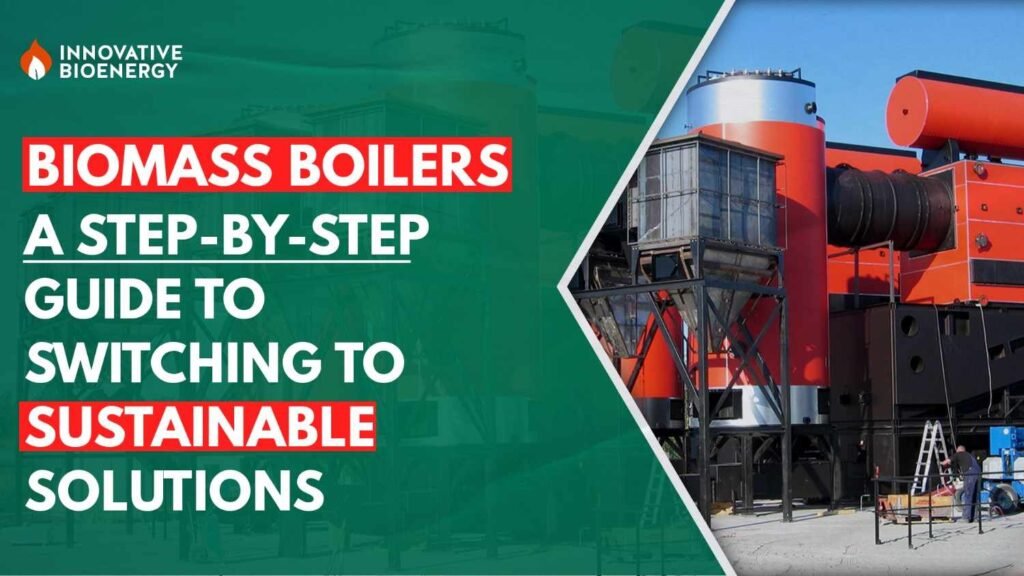As energy prices continue to rise sharply and the climate crisis intensifies, traditional heating systems such as gas and oil boilers are proving to be both economically and environmentally unsustainable. These outdated systems rely on fossil fuels, which are among the leading contributors to carbon emissions and global warming. With increasing pressure from governments and stakeholders to meet carbon neutrality and net-zero targets, industries are under growing demand to shift toward renewable energy sources.
The good news is that a reliable and eco-conscious alternative exists. Biomass boilers provide a clean, efficient, and sustainable heating solution for commercial and industrial properties that aim to cut emissions and reduce long-term energy costs.
The question is no longer if we should make the switch but how. This guide will walk you through everything you need to know to transition from fossil-fuel-based heating to a low-carbon, renewable heating system powered by biomass energy.
What Is a Biomass Boiler?
A biomass boiler is a renewable energy heating system that burns organic materials like wood pellets, logs, or agricultural waste. These systems offer eco-friendly heating designed to reduce carbon emissions while delivering reliable, long-term performance.
Whether you’re managing an industry or a commercial facility, understanding how to install and operate a biomass boiler is key to making the switch to clean energy.
Biomass boilers require a consistent and high-quality fuel supply to operate efficiently. That’s where companies like Innovative Bioenergy come in. We manufacture premium-grade wood pellets and briquettes from sustainable agricultural and industrial waste, perfect for industries and businesses transitioning to renewable heat sources.
Why Switch? A Comparison With Traditional Boilers
| Feature | Biomass Boiler | Traditional Boiler |
| Fuel Source | Organic materials: pellets, logs, chips, agri-waste | Fossil fuels: gas, oil, or electricity |
| Sustainability | Renewable and carbon-neutral | Non-renewable, carbon-intensive |
| CO₂ Emissions | Very low (short carbon cycle) | High (burns ancient carbon) |
| Greenhouse Effect | Helps reduce emissions | Contributes to climate change |
| Fuel Cost | Often cheaper (especially in bulk) | Subject to volatile global markets |
| Govt Incentives | Eligible in many regions | Rare or nonexistent |
| Savings Potential | High over time | Limited to fuel price fluctuations |
| Installation Needs | Requires space for boiler and fuel storage | Compact; easier installation |
| Maintenance | More frequent (can be automated) | Less frequent |
| Carbon Neutrality | Yes | No |
| Future-Proof | Aligned with net-zero targets | May face restrictions or bans |
Biomass boilers support the energy transition by reducing carbon footprints and offering long-term financial savings. If you’re still wondering which option truly saves more money in the long run, read our detailed comparison of biomass vs fossil fuels to see which energy source offers better financial and environmental returns.
Step-by-Step Guide to Installing a Biomass Boiler
1. Assess Your Property’s Needs
Review your current heating setup, available space, and energy demand. This helps determine the size and type of boiler required.
2. Choose the Right Biomass Boiler
Select between manually-fed or automated models. Fuel options (pellets, chips, logs) have varying handling and storage requirements.
3. Design the Installation Layout
Plan the boiler room, fuel storage area, and chimney/flue system. Ensure compliance with safety and ventilation standards.
4. Hire Certified Professionals
Always use trained and certified installers to meet legal and energy efficiency guidelines.
5. Apply for Government Incentives
Check your region’s renewable heating programs; many offer grants or subsidies to offset installation costs (e.g. the Renewable Heat Incentive).
Choosing the Right Fuel Supplier
Even the most advanced biomass boiler won’t perform well without the right fuel. Look for suppliers who offer:
- Low-moisture pellets or briquettes
- Sustainable sourcing and ESG compliance
At Innovative Bioenergy, we provide high-efficiency wood pellets, biomass pellets, and briquettes tailored for commercial and industrial users. Our fuels are manufactured to deliver high heat value while reducing emissions and operational costs.
Are Biomass Boilers Worth the Investment?
Yes, especially for properties with reliable access to biomass fuel and storage space. Biomass systems may reduce heating costs by 40–50% over time, making them financially and environmentally worthwhile.
Maintenance Best Practices
- Empty ash regularly (depends on boiler type)
- Schedule annual professional servicing
- Store fuel in a dry, well-ventilated space
- Use high-quality fuel to minimize buildup and maintain efficiency
Modern systems often include automated cleaning and self-feeding mechanisms to simplify maintenance.
Final Thoughts: A Greener Future Starts with One Switch
Switching to biomass boilers isn’t just an upgrade, it’s a transformation toward sustainable energy, lower emissions, and long-term cost savings. As industries and commercial facilities face increasing pressure to meet carbon neutrality targets, adopting a renewable heating solution is no longer optional; it’s essential.
At Innovative Bioenergy, we’re here to make that transition seamless. With our premium wood pellets, biomass briquettes, and expert guidance, we provide everything you need to ensure your biomass boiler system runs at peak efficiency.
Cut your carbon. Slash your heating bills. Power your future with bioenergy. Contact us today to get started:


